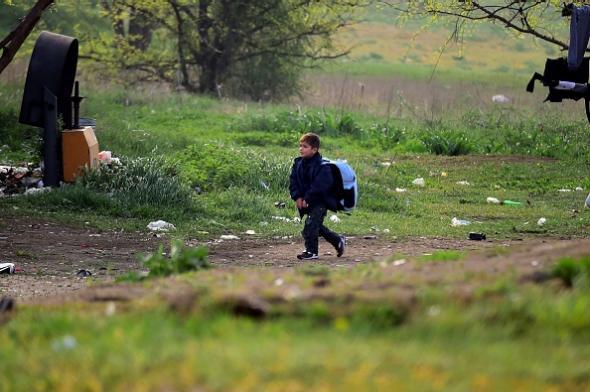
Attila Kisbenedek/AFP/Getty Images
Provoked, he says, by televised images of children dying in a gas attack ordered by Bashar al-Assad, Donald Trump launched a missile strike against a Syrian airfield on Thursday night. Politicians who are almost always critical of Trump (most prominently Chuck Schumer and Nancy Pelosi) have reacted by praising the strike as morally righteous; media outlets that have had an adversarial relationship with the president (CNN, the New York Times) have respectfully saturation-covered his decision as the Big Moment of a Serious Leader.
There is an instinctive pattern in American media and politics—one that seemed less obviously objectionable during the relatively nondisastrous small-scale interventions of the Reagan, Bush I, and Clinton years—that this is how one treats an American military attack: as a BREAKING moment of Kennedy assassination–esque national solidarity and urgency that is of interest primarily for the way it reflects the firm moral resolve of the president who ordered it.
Place your hand over your heart—a man’s Legacy is being Defined.
And yet, we’ve also learned over the past, oh, 16 or so years in places like Iraq and Libya that letting an ostensibly righteous military blitz against an unsympathetic enemy constitute the entirety of our response to a foreign crisis is some really dumb stuff. In this specific case, deferring to Trump’s framing of the missile attack as the expression of righteous humanitarian principles requires one to enter an alternate universe in which the past four years of Syrian atrocities weren’t taking place while Trump loudly and repeatedly declared that the United States should never challenge Assad or admit Syrian refugees. As my colleague Joshua Keating wrote Thursday about this week’s chemical attack:
No doubt, the footage from the attack is hard to take. But you have to wonder why Trump’s humanity was not similarly touched by the children killed in the 2013 Ghouta chemical attack, the stomach-churning allegations of systematic torture of children by Syrian forces, the many children killed by the Syrian regime’s barrel bombs, or the now iconic photo of a dazed little boy covered in dust in an ambulance in Aleppo, not to mention the also iconic image of a drowned Syrian refugee boy on a beach in Turkey. While all this was going on, Trump was arguing that the U.S. should be working with Assad, who he called a potential “natural ally.”
Bashar al-Assad and the monsters fighting on his behalf deserve much worse than seeing one of their airfields destroyed. But they’re probably going to win this war, and the U.S. president’s impulsive decision to bomb them in the meantime does not deserve our deference, or even the lion’s share of our attention. The problem Syria presents is much bigger than the question of exactly how righteous it is to launch 59 missiles against an airfield—and, for the love of God, certainly dwarfs the question of whether that launch embiggens the dignity of a man who’s made multiple appearances in soft-core pornography videos and who just days ago finalized an agreement to pay $25 million in refunds to people whom he’d ripped off in a high-pressure sales scam.
But it’s not inevitable that a missile launch has to be treated as an act of grave patriotism that occupies the entirety of the national consciousness for days or weeks. We can, in theory, ask the politicians who represent us and the media that reflects us to attend instead to the bigger picture—namely, to the millions of urgently needy Syrian refugees who have not yet been able to figure out how to use Tomahawk missiles to clothe or feed themselves. Might the most prosperous country on Earth be able to do something for these people? It’s been said before, but today—at the moment that, after all, our president’s legacy is being defined—we can say it again: Let them in. Let them in. Let them in.